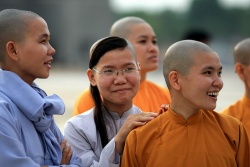Pramiti
Pramiti (般剌蜜帝, 7th–8th centuries) means correct measure.
He was a Monk from central India. On his first attempt to carry the Śūraṅgama Sūtra to China, he was found out by coast guards and was turned back.
More determined than ever to have the Dharma spread throughout China, he copied the Sūtra onto fine white fabric and had it sewn under the skin of his arm.
After his arm was healed, he passed the inspection and was allowed to leave India.
Pramiti traveled by sea and arrived in Guangzhou (廣州), Guangdong Province, in 705, the first year of the Shenlong (神龍) years of Emperor Zhongzong (唐中宗) of the Tang Dynasty (618–907).
He stayed at the Zhizhi Temple (制止寺) in Guangzhou and started to translate this Śūraṅgama Sūtra in 10 fascicles.
He was assisted by Miccaśakya (彌伽鑠佉), an Indian Monk from Udyāna, who helped render the Sanskrit text into Chinese, and by Fangrong (房融), a Chinese layman, who recorded the translation.
Then a learned Chinese Monk named Huaidi (懷迪) reviewed the Chinese translation (T19n0945) in Light of the meaning conveyed by the Sūtra.
It did not take too long for the king, furious about Pramiti’s taking the Sūtra out of The country, to send agents to find Pramiti.
He was found and, under the escort of the agents, willingly returned to India, to accept the responsibility for his action.
The story goes that Ācārya Nāgārjuna (龍樹菩薩, circa 150–250), who is revered in China as the distant originating Patriarch of eight Mahāyāna Schools, in his Meditation, saw the Śūraṅgama Sūtra and the Mahāvaipulya Sūtra of Buddha Adornment in the dragon-king’s palace, and he memorized these texts.
Then he wrote down everything from memory. The Śūraṅgama Sūtra was considered a national treasure and kept in the Nālandā Monastery. Though it was forbidden to take this Sūtra outside The country, it was smuggled out by Pramiti.
There was another good reason for the arrival of this Sūtra in China.
Over one hundred years earlier, an Indian Monk remarked to Master Zhiyi (智顗, 538–97), the founding Patriarch of the Tiantai School of China, that the threefold Meditation of his School accorded with the tenets of the Śūraṅgama Sūtra.
Master Zhiyi was so inspired that he had a platform built on the peak of the Tiantai Mountain.
For the eighteen years until his Death, on this platform he routinely bowed down toward the west, requesting this Sūtra to come to China. However, he was not to see this Sūtra in his Life.
This obeisance-to-the-Sūtra platform is still there today on the Huading Peak (華頂峰) of the Tiantai Mountain, in Zhejiang Province.

